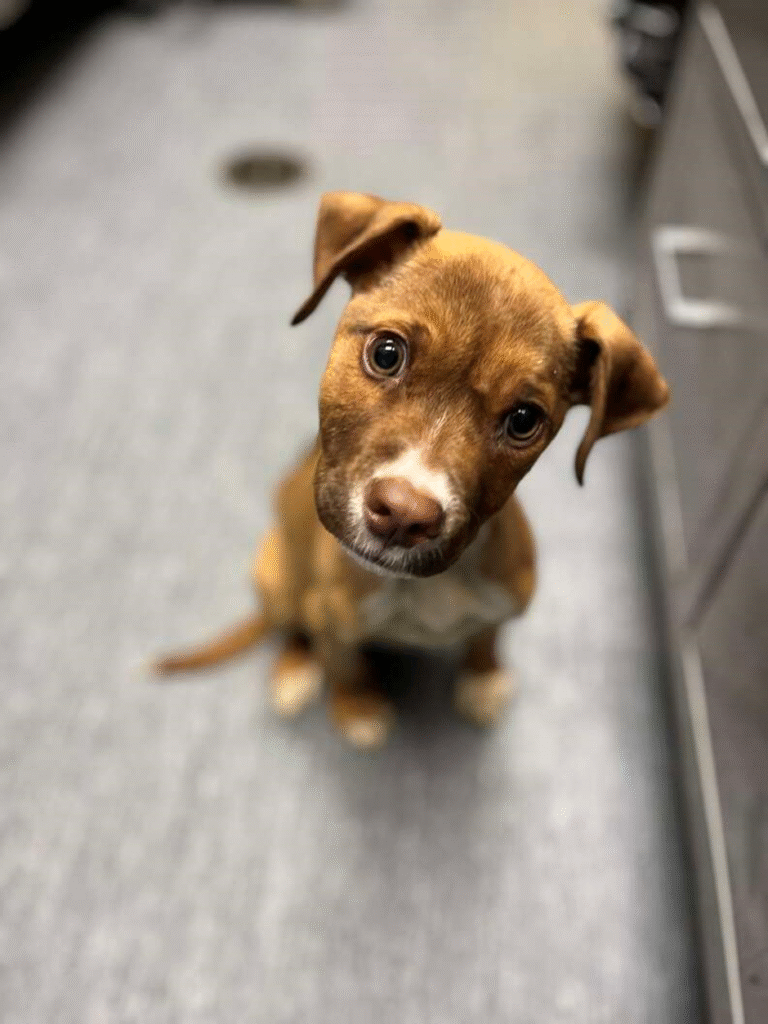Leo hated these shifts. Not because of the cold—he was layered against the biting November air—but because of the deep, pervasive silence of the ancient woodland at midnight. As a wildlife monitoring technician, he was usually tracking deer migrations or monitoring owl nests, but tonight, he was part of a search-and-rescue team looking for a dog lost since the weekend. The forest floor was too thick, the underbrush too heavy, and the dog’s scent long dispersed by the wind.
He raised the thermal imaging camera, sweeping the lens across the dense thicket of pines. To the naked eye, it was just black shapes and shadows; through the camera, it was a tapestry of cool blues and purples—the low ambient temperature of the woods. He was about to lower it when a sudden, unmistakable spot of vibrant orange and yellow flashed on the screen, nestled low among the roots of a giant oak.

It was small, about the size of a loaf of bread, but intensely hot. Too small for the German Shepherd they were looking for, but too compact and high-temperature for a rabbit or raccoon. It was a perfect, concentrated beacon of life against the icy backdrop of the dying woods.
“Hold up,” Leo murmured into his radio. “I’ve got a contact. Small. Unidentified. Very low, near the base of the Big Oak by the creek bed.”
He moved slowly, stepping over slick moss and fallen logs, the thermal image guiding him like a lifeline. As he got closer, the spot of heat resolved itself. It wasn’t a log or a rock—it was a creature, tucked into a shallow, protective hollow.
When Leo reached the spot and turned on his headlamp, the heat signature translated into a tiny, living animal. It was a dog, or perhaps a large puppy, but so disheveled and covered in mud, leaves, and burrs that its breed was indiscernible. It was just a matted, shivering ball of desperation.
The moment the light hit him, the animal recoiled deeper into the shadow, letting out a soft, almost silent whimper. He wasn’t shaking violently; his terror was too profound for that. He was locked in a state of rigid, paralyzed fear.
Leo carefully set the camera down. He didn’t rush. He knew this dog, small as he was, had spent days fighting the cold, the hunger, and the constant, crushing silence of isolation. He had managed to stay hidden from everything—coyotes, the wind, and humans—until the thermal pulse of his own survival gave him away.
“Hey, little one,” Leo whispered, sinking to his knees. “You’re okay. The search is over. You’re safe now.”

He spent the next fifteen minutes simply talking in a low, even tone about the weather, about his boring job, about anything that sounded routine and non-threatening. He offered a small packet of soft cheese. The puppy didn’t move.
Finally, Leo did the only thing he could. He reached out a gloved hand and gently placed it on the small, matted pile. The puppy flinched violently, but Leo didn’t pull back. He just rested his hand there, offering a steady, reliable warmth that wasn’t generated by a frantic, dying body, but by a human offering comfort.
Slowly, the tension in the tiny body released just enough for Leo to gently scoop him up. The puppy was terrifyingly light. Leo tucked him inside his heavy fleece jacket, where the soft, steady thump of his own heart could act as a rhythmic anchor against the wilderness. Because of the orange glow he showed on the camera, Leo decided to call him Ember.
The vet confirmed Ember was a young male, barely a year old, and severely malnourished. He was not microchipped, and no one claimed the scruffy survivor. He was an orphan in the truest sense.

The first step was the grooming. Ember’s coat was a disaster—so caked with dirt and fused with sticky mats that his skin underneath was red and irritated. It took the combined effort of the vet and a patient groomer over two hours to carefully cut and trim away the layers of wilderness he’d been carrying.
Underneath the trauma, Ember was revealed to be a magnificent creature: a small dog of indeterminate fluffy heritage, possibly a Maltese or a Bichon mix, with fur as white and soft as fresh snow and eyes as dark and worried as the night Leo found him.
But the physical transformation was nothing compared to the emotional one. Ember still reacted to every shadow, every squeak, with a flinch that went bone-deep. He wouldn’t play, he wouldn’t make eye contact, and he would only sleep if he was touching a solid object, preferring a cold wall to a soft bed. He was still in the woods, even when he was inside.
Leo, who had decided to foster him indefinitely, was determined. He understood that Ember needed predictability to counter the chaos of his abandonment and the shock of the cold, chaotic woods.
He started a routine that never varied: 7 AM wake-up, quiet breakfast, thirty minutes of sitting in the sun, and the same bedtime cuddle. He also started introducing him to texture.

Ember’s true breakthrough came not through food or walks, but through a shared afternoon nap. Leo was working on his laptop on the couch, and Ember, following his rule of always having physical contact, hesitantly jumped up and pressed himself against Leo’s thigh. He fell asleep instantly, the deepest, most relaxed sleep Leo had ever seen him manage.
It was during these quiet, shared moments that Ember’s essence finally unfurled.
The trauma started to recede, replaced by a gentle, overwhelming loyalty. The flinch became a quick glance. The terrified crouch became a proud, fluffy stance. He realized that the world wasn’t a place of unpredictable, icy darkness, but a place of soft blankets and constant, steady hands.
His coat, now maintained with loving care, grew into a spectacular, snowy cascade. He had truly transformed. He became a dog of elegant movement, his steps light and buoyant, no longer weighed down by the terror of the earthquake or the grime of the wilderness.

Ember now spends his days as Leo’s constant shadow, his fluffy white tail wagging with a reserved but complete joy. He is no longer the frantic little heat signature Leo saw on the screen; he is a beacon of peace in Leo’s quiet home.
Sometimes, when the wind howls outside, Ember will lift his head and listen, a brief, worried tremor passing through him. But he doesn’t panic. He just turns his head, meets Leo’s gaze, and presses his now-magnificent body closer to the familiar, grounding warmth of his person. He knows that the cold, dark woods are gone, replaced forever by the unwavering, predictable light of love. The camera saved his life by finding the heat, but the love is what keeps the warmth burning.



